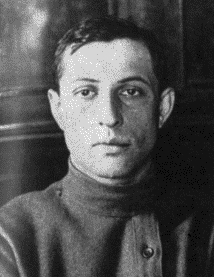Leonid Kannegisser
Leonid Kannegisser | |
|---|---|
 Kannegisser in 1918 | |
| Born | March 1896 Nikolaev, Russian Empire |
| Died | October 1918 (aged 22) Petrograd, Russian SFSR |
| Cause of death | Execution by firing squad |
| Allegiance | Imperial Russian Army |
| Service | Artillery |
| Years of service | 1913–1918 |
| Rank | Junker |
Leonid Joakimovich Kannegisser (Russian: Леони́д Иоаки́мович (Аки́мович) Кáннегисер, romanized: Leonid Ioakimovich (Akimovich) Kannegiser; March 1896 – October 1918) was a Russian poet and military cadet, known for assassinating Moisei Uritsky, chief of the Cheka in Petrograd, on 17 August 1918.[1]
Life and career
[edit]
Leonid Kannegisser (also spelled Kanngießer or Kannegiesser)[2] was born in March 1896 in Nikolaev, Ukraine, (then part of the Russian Empire), into a wealthy Jewish family. His father, Akim (Joachim) Kannegisser, was a mechanical engineer and the head of Russia's largest shipyards, the Black Sea Shipyard, and his mother was a doctor. Kannegisser graduated from a private school and in 1913 became a military cadet in the Mikhailov Artillery School of the Imperial Russian Army. Kannegisser studied economics from 1915 to 1917 at the Petrograd Polytechnic Institute and was a member of Popular Socialists, a moderate left-wing anti-bolshevik political party. An admirer of Alexander Kerensky,[2] on the night of 25 to 26 October 1917 (Old Style Julian Calendar), during the October Revolution, Kannegisser and several other cadets defended the Provisional Government at the Winter Palace. In 1917 he dedicated a poem to Alexander Kerensky.[2]
Uritsky's assassination
[edit]On 17 August 1918 around nine o’clock, Kannegisser, wearing a leather jacket and an officers cap, turned up at the People's Commissariat of Internal Affairs, left his bicycle by the door and entered the building. Uritsky arrived in his car at around ten o’clock, and a few moments later he was fatally shot in his head and body by Kannegisser. After shooting Uritsky, he ran out into the street and tried to escape on his bicycle, riding quickly but was chased by a car. He threw away his bicycle and ran into the British embassy. Kannegisser left the embassy after having donned a longcoat, after which he opened fire on Red Guards but he was arrested.
Kannegisser was interrogated. He declared that he had acted alone and was executed shortly afterwards in Petrograd.[3][4] Following his arrest, the Bolshevik authorities also arrested several members of his family and friends.[3]
Motivation
[edit]Kannegisser was part of a clandestine anti-Bolshevik group led by his cousin, Maximilian Filonenko, who had close links with Boris Savinkov, who gave the order to assassinate Uritsky. Kannegisser's lover, an army officer named Viktor Pereltsveig, was executed with a group of officers by the Cheka in the summer of 1918. It was Uritsky who signed the execution orders, so Kannegisser decided to take revenge.[3]
Poetry
[edit]
From childhood Kannegisser had written poetry and was a friend of Sergei Yesenin. He hosted in his house many literary meetings, where Marina Tsvetaeva, Osip Mandelshtam and others presented their poetry.[5] A decade after Kannegiesser's execution his poems were posthumously published by Mark Aldanov in Paris in 1928. A major part of Kannegisser's literary heritage is preserved in the closed files of the Central Government Archives of Literature and Art in Moscow.[6]
References
[edit]- ^ Vitaliy Shentalinsky, "Crime without punishment", Progress-Pleyada, Moscow, 2007, ISBN 978-5-93006-033-1 (Russian: Виталий Шенталинский, "Преступление без наказания"), Chapter 2, Poet-terrorist. Link to text in Russian Journal
- ^ a b c Dralyuk, Boris (18 October 2017). "Dartmouth and Leonid Kannegiesser (2010-1918)". bdralyuk.wordpress.com. Archived from the original on 5 September 2019. Retrieved 22 September 2019.
- ^ a b c Malmstad, John E.; Bogomolov, Nikolay (2001). "No Time for Poets". thefreelibrary.com. Archived from the original on 22 June 2018. Retrieved 22 September 2019.
- ^ Lina, Jüri. "Under the Sign of the Scorpion: the Rise and Fall of the Soviet Empire". jyrilina.com. Archived from the original on 22 September 2019. Retrieved 22 September 2019.
- ^ Shentalinsky, page 115.
- ^ "Kannegiser, Leonid Akimovich". jewishvirtuallibrary.org. Archived from the original on 5 November 2018. Retrieved 22 September 2019.
- 1896 births
- 1918 deaths
- 1918 crimes in Europe
- Jewish anti-communists
- Jews from the Russian Empire
- Executed people from the Russian Empire
- Executed assassins
- Assassins from the Russian Empire
- Male poets from the Russian Empire
- Executed people from Ryazan Oblast
- People from Mikhaylovsky District, Ryazan Oblast
- People executed by Russia by firing squad
- 20th-century Russian poets
- Anti-communists from the Russian Empire
- 1918 in Russia
- Russian LGBTQ poets
- LGBTQ Jews
- 20th-century Russian LGBTQ people
- White movement people executed by the Soviet Union
